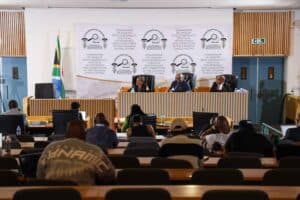The Putin matter before the high court showed the continued resilience of the judiciary.

If the world wants a measure of South Africa’s commitment to the treaties and conventions it signs, it now has one. President Cyril Ramaphosa this week made it clear that it’s pretty much nonexistent. When push comes to shove, with the ANC, expediency will always triumph over principle and legal obligations.
In an affidavit that Ramaphosa wanted to be kept secret but which a judge ruled a public document, the president said that his government could not and would not execute an International Criminal Court war crimes warrant for the arrest of Russia’s President Vladimir Putin.
ALSO READ: SA government commits to arresting Vladimir Putin if he sets foot in country
This would be the second time that SA, an influential founding signatory to the Rome Statute that established the court in 1998, would have reneged on its commitments.
On the upside, the proceedings before the high court showed the continued resilience of the judiciary – as did the Constitutional Court’s refusal last Friday to hear an appeal by former president Jacob Zuma against being returned to jail to complete the sentence that he had escaped courtesy of a fake medical parole.
It’s a reminder, too, of the importance of opposition parties and civic action groups continuing to aggressively challenge bad laws, executive overreach, procedural secrecy and administrative failures.
ALSO READ: DA pushes ahead with Vladimir Putin matter
The original high court action over Zuma’s politically contrived release was brought by the DA, the Helen Suzman Foundation and AfriForum; the application regarding Putin’s arrest by the DA.
In the Putin matter, Ramaphosa’s affidavit reads: “Russia has made it clear that arresting its sitting president would be a declaration of war. It would be against our constitution to risk engaging in war with Russia.”
It would be a “reckless, unconstitutional and unlawful exercise of the powers conferred upon the government to declare war with Russia.”
ALSO READ: ‘Mr Putin, can you hear us?’ – Russian president to join Brics summit by video
One can understand why Ramaphosa would want to keep such an illogical, legally threadbare document secret. In essence, he is saying South Africa will gaily sign international conventions but if asked to abide by them, will, on the flimsiest pretexts, fail to honour its obligations.
Or, as the DA argued in its affidavit, Ramaphosa was asking the court to excuse the government from its international and domestic law obligations because a foreign state was threatening SA with illegal war if it complied.
The ruling by Deputy Judge President Roland Sutherland may be legally moot in light of the announcement on Wednesday that Putin will, “by mutual agreement”, not attend and instead be represented by Foreign Minister Sergey Lavrov. However, the DA says it will proceed with its application.
It would seem to the layman that the DA’s application comes perilously close to asking the judiciary to intervene preemptively in an unfolding action by the executive branch. Because of the doctrine of separation of powers, that would be an obvious constitutional no-no.
ALSO READ: ‘This follows Mandela’s example’: Madonsela weighs in on Putin Brics summit decision
However, the separation of powers is arguably trumped if the executive is planning to break the law.
In almost identical circumstances, the 2015 ANC flouted its constitutional obligations when it failed to implement an ICC warrant to arrest another genocidal pal of the ruling party, Sudanese president Omar al-Bashir.
As with Putin now, the government refused to publicly state whether it would fulfil its treaty obligations while, behind the scenes, providing al-Bashir with assurances that it would be safe to attend.
Meanwhile, the Kremlin, which could have saved its dear friend Ramaphosa much trouble by simply agreeing at the outset that Putin would not attend, is playing the wide-eyed innocent.
ALSO READ: Putin has saved Ramaphosa a whole lot of grief
It has denied telling South Africa that arresting Putin would mean war: “Everyone understood, without having it explained to them, what an attempt to infringe on Putin’s rights would mean.”
With friends like that, who needs enemies?






